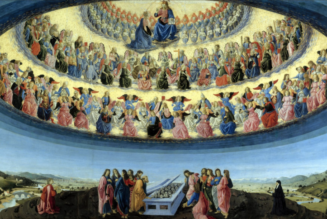
“In the morning, a great while before day, he rose and went out to a lonely place, where he prayed” (Mark 1:35)
In the first chapter of the Gospel of Mark, the evangelist provides us with a window into what a day in the life of Jesus looks like. As one can imagine, it’s quite busy. St. Mark records that after leaving the synagogue where he has cast out an evil spirit (Mk 1:25), Jesus enters the home of Simon, whose mother-in-law is lying in bed sick with a fever. Jesus immediately comes to her, takes her by the hand, and heals her. Shortly after we are told that the people of the area “brought to him all who were sick or possessed with demons. And the whole town was gathered together about the door” (Mark 1:32-33). Despite attending to the multitudes, healing the sick, and exorcising demons, Jesus’ apostolic work is not finished. The next day we are told that Jesus is preparing to move on to the surrounding towns to preach, and, one would assume, continue healing the sick and casting out evil spirits.
Yet despite all this busyness and overwhelming need, we are told that Jesus, “In the morning, a great while before day…rose and went out to a lonely place, and there he prayed” (Mark 1:35). How mysterious and beautiful is this verse and the reality that it signifies? Yet also, how strange it is. Why would the Second Person of the Holy Trinity need to pray? Why would he choose to step away for a time of solitary prayer, when it is very clear that so many people are in desperate need of him? The answer, I believe is twofold.
First, Jesus knows that the entire universe is not only in the hands of the Father but more importantly, it is in the Father’s heart. Jesus will reference the Father’s tender care for all of his children and his own trust and faith in the Father’s goodness later in the Gospel when he says, “Do not be anxious about your life, what you shall eat or what you shall drink, nor about your body, what you shall put on…your Father knows that you need them all” (Matthew 6:25:32). Is Jesus dismissing the importance and necessity of apostolic work? Is he advocating merely a passive approach regarding the necessities of life, both for ourselves and others? Of course not, but what Jesus is reminding us of is an important truth that is meant to serve as the foundation for both our earthly life and ministry and our spiritual life.
The truth is this: the Father is always caring and providing for us in every moment of life. If he were not, the world and we ourselves would not exist. Therefore, we do not have to be anxious, we do not have to kill ourselves by overworking, and most importantly we can enjoy time alone with the Father to marvel more deeply in his love, goodness, and providential care for all of us.
Second, Jesus understands prayer very differently than many people. For Jesus prayer is not merely a means to get something from the Father. It is not an opportunity for him to try and show the Father that he is loveable, good, and faithful, and therefore the Father should give him whatever he asks for. Prayer is not merely an obligation that he is performing to fulfill the requirements for a proper relationship with God. Rather, prayer is an opportunity to intensify and deepen His union with the Father, to express His love for the Father, and to receive the Father’s love more deeply. This is why Jesus seeks out times of solitary prayer.
I have often believed that how a person understands prayer will ultimately reveal who they understand God to be. By seeking out times of solitary prayer, Jesus is revealing to us that the Father is not some cold, disinterested, transcendent being hidden away in another universe. Rather, God the Father is one who is near, affectionate, and interested in every detail of our lives.
To put it more simply, Jesus is teaching us that prayer is ultimately about love: receiving the Father’s love and loving Him in return. People who are in love never need an excuse to be together, especially when they desire to be alone. Love is the very reason for their solitude together. There is no explanation necessary.
*
The most characteristic trait of Jesus in the Gospels is that he is always seeking the Father. His only desire is to do the Father’s will (John 4:34). His primary mission is to reveal to the world the Father and His love (John 14: 9-11). Jesus’ motivation for all the healings, exorcisms, and even his Passion is to glorify the Father (John 17:4). Naturally then because the Father is who Jesus loves most, he will regularly seek out solitude with Him. The frequency with which Jesus does this, and we see Him do this all throughout the Gospels, (Mt 14:23, Mk 6:46-47, Lk 6:12, Jn 6:15) reveals the intensity of his love for the Father. If we are to imitate Jesus, as all of us are called to, then we too must seek the Father with a similar intensity. To the extent that we seek the Father in solitary prayer, our love for Him will be revealed.
It is important to acknowledge that prayer for most people does not begin with this solitary nature, at least usually. The more generous a person is in prayer, always in obedience to their state of life, the more deeply they will be led into this solitude, where they will seek to be alone with God more regularly. This does not mean that one must become a monk or a nun, or if they are married, ignore their families and their responsibilities so that they can spend hours alone with God in prayer. Rather, this shift in prayer is more subtle. As a person begins to grow in their life of prayer, very gradually they will desire and begin to seek out opportunities to be alone with God, whether that be for 5 or 10 minutes or an hour or two. The distinctive characteristic of this solitary prayer is not primarily to meditate upon God, as good and necessary as that is, but simply to be with him in greater love and receptivity.
St. John of the Cross teaches that there are three signs one should use to discern when a person can leave discursive meditation and pass on to the grace of contemplation, i.e., contemplative prayer[1]. The third sign, which he believes is the most important, is the following: “A person likes to remain alone in loving awareness of God, without particular considerations, in interior peace and quiet and repose, and without acts and exercises, ( at least discursive, those in which one progresses from point to point) of the intellect, memory, and will.”[2] Hence, a key sign of growth in our spiritual life is both the desire and the ability to be with God in solitary prayer. Furthermore, St. John of the Cross also teaches that it is in contemplative prayer where God performs the most purifying and healing work in a soul, which implies the absolute necessity of solitary prayer for us if we truly desire holiness.
The religious order that I belong to, the Franciscan Friars of the Renewal, is an active religious order, meaning that my community is engaged in various apostolic works that include things like hands-on work with the poor, preaching, and other forms of ministry. Throughout my religious life, I have worked with other apostolic religious orders and ministries in the church. During that time, I have listened to many people speak about the need to be generous in the apostolate and in fraternal life. However, in my own experience, I have not heard many people speak about the need to be generous in one’s life of prayer. Without generosity in prayer, there can be little to no real generosity in the apostolate or fraternal life. The reason for this is that the demands of the apostolate and fraternal life are simply too much for us.
They are beyond our natural strength.
Without a deep life of prayer, our apostolic life will possess a major problem; there will be too much of ourselves in it. Our preaching, helping the poor, and simply living the Christian life with others will contain too much of our own anxieties, fears, and insecurities. Of course, the grace of God can and does work through all of this, however, if we are to provide the world with the greatest possible Christian witness then we need, as much as possible, a transfigured humanity, one that reflects and reveals the love and mercy of the Father.
When we imitate Jesus and seek the Father more regularly in solitary prayer, this transformation is that much closer.
*
A few days before my ordination to the priesthood, I was on retreat at the seminary with my classmates. One morning I went to the cafeteria to get a cup of coffee and an older priest, whom I had never seen before at the seminary, was doing the same. He asked me if I was one of the seminarians who would be ordained in a few days. I said yes and he asked me to sit down with him for a few minutes and share some of my vocation story with him. As I was finishing my story, I asked him if he had any advice for me, since he had been a priest for over thirty-five years. He paused for a moment, looked out the window, and said, “It’s great that you studied all this theology, but remember the world doesn’t need theology, it needs God, and for your theology to have any impact in people’s lives, you must meet the living God every day in solitary prayer. If you don’t, nobody will listen to you, nor should they.”
After he spoke those words the only place I could go was the chapel. I had always known that prayer was the most important aspect of my life and vocation, however, the words this priest spoke to me appeared not only as a confirmation of the importance of prayer but almost as a command from God himself. As I knelt in that chapel staring at the tabernacle, I sensed the Lord continuing the conversation by telling me, “Your vocation is going to be difficult. Your intelligence, theology, religious order, and talents are not going to save you. Only I can save you and form you into the priest you are meant to be. However, if you don’t spend time each day in solitary prayer, I can’t help you.”
I have been a priest now for over thirteen years and those words I heard both from that priest in the cafeteria and from God in the chapel shortly before my ordination are truer than ever. There are new problems and difficulties in the world, the Church, and even in my own heart. However, the more generous I am in my life of prayer, especially solitary prayer, the more intimately I experience the Father’s love, goodness, and nearness to me. This prayer, the greatest treasure in my life, is not only for me. What I have received in those daily encounters with God in solitude I have attempted to share in all the many people my priesthood has served, and in all the varied ways God has willed. Though I am not always able to see the fruit of my ministry, I trust that God’s grace is at work through me. One thing I do know is that without solitary prayer, I would lack the strength and trust to continue moving forward because I cannot save myself or anyone else.
[1] The Collected Works of St. John of the Cross: The Ascent of Mount Carmel, Book Two, Chapter 13 (Washington, DC: Institute of Carmelite Studies, 1991), 190.
[2] Ibid, 190.









